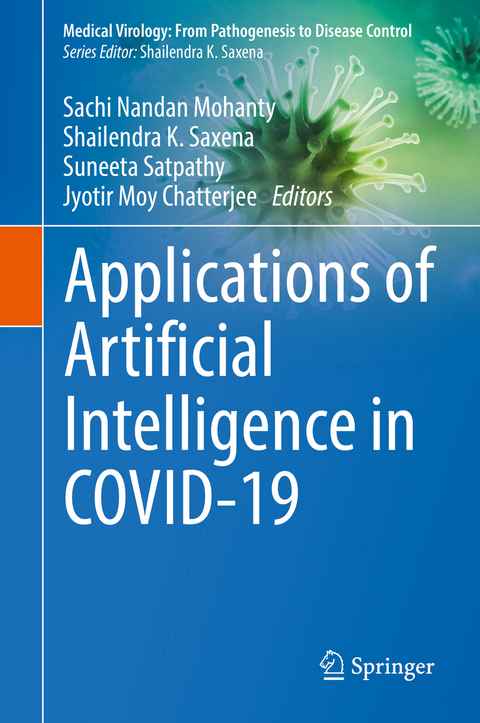
Applications of Artificial Intelligence in COVID-19
Springer Verlag, Singapore
978-981-15-7316-3 (ISBN)
Dr.Sachi Nandan Mohanty, He received his PostDoc from IIT Kanpur in the year 2019 and Ph.D., from IIT Kharagpur, India in the year 2015, with MHRD scholarship from Govt of India. He has edited 24 books in association with Springer and Wiley, His research areas include Data mining, Big Data Analysis, Cognitive Science, Fuzzy Decision Making, Brain-Computer Interface, Cognition, and Computational Intelligence. Prof. S N Mohanty has received 3 Best Paper Awards during his Ph.D at IIT Kharagpur from International Conference at Benjing, China, and the other at International Conference on Soft Computing Applications organized by IIT Rookee in the year 2013. He has awarded Best thesis award first prize by Computer Society of India in the year 2015. He has guided 6 PhD Scholar. He has published 60 International Journals of International repute and has been elected as FELLOWS of Institute of Engineers and IETE with Senior member of IEEE Computer Society Hyderabad chapter. Prof. (Dr.) Shailendra K. Saxena is the Vice Dean and a Professor at King George's Medical University, Lucknow. His primary research interest is investigating the molecular mechanisms of host defense during human viral infections in order to develop predictive, preventive and therapeutic strategies against these diseases. He has received young scientist awards, and the BBSRC India Partnering Award and was named the Global Leader in Science by The Scientist magazine (USA). He has been elected a Fellow of The Academy of Environmental Biology, India (FAEB), and the Indian Virological Society (FIVS). He was also the recipient of the Dr. JC Bose National Award from the Department of Biotechnology (Govt. of India). Jyotir Moy Chatterjee is currently working as an Assistant Professor of IT department at Lord Buddha Education Foundation (Asia Pacific University of Technology & Innovation), Kathmandu, Nepal. His research interests include cloud computing, machine learning, the internet of things, data mining, and blockchain technology. Dr.Suneeta Satpathy received her Ph.D. from Utkal University, Bhubaneswar, Odisha. She is currently an Associate Professor at the Department of Computer Science & Engineering at the College of Engineering Bhubaneswar. Her research interests include computer forensics, cyber security, data fusion and decision mining. She is an editorial board member and reviewer for several journals including the Journal of Engineering Science, Advancement of Computer Technology and Applications, and Robotics and Autonomous Systems.
Chapter 1.Comprehensive Claims of AI for Healthcare Applications-Coherence towards COVID-19.- Chapter 2. Artificial Intelligence based systems for combating COVID-19.- Chapter 3. Artificial intelligence mediated medical diagnosis of COVID-19.- Chapter 4. AI combined with medical imaging enables rapid diagnosis for COVID-19.- Chapter 5. Role of Artificial Intelligence in COVID-19 prediction based on Statistical Methods.- Chapter 6. Data Driven symptom Analysis and Location Prediction Model for Clinical Health Data Processing and Knowledgebase Development for COVID 19.- Chapter 7. A decision support System using Rule based Expert System For COVID -19 Prediction and Diagnosis.- Chapter 8. A Predictive Mechanism to Intimate the Danger of Infection via nCOVID-19 through Unsupervised Learning.- Chapter 9. AI-enabled prognosis technologies for SARS Co-2. Chapter 10. Intelligent agent Based Case Base Reasoning Systems Build Knowledge Representation in COVID-19 analysis of Recovery, Infectious Patients.- Chapter 11. Epidemic Analysis of COVID 19 Using Machine Learning.- Chapter 12. Machine learning application in COVID-19 drug development.- Chapter 13. COVID 19 Epidemic Analysis Using Linear and Polynomial Regression Approach.- Chapter 14. Prediction & Analysis of outbreak of COVID-19 Pandemic Using Machine Learning.- Chapter 15. Predictive Risk Analysis by using Machine Learning during Covid-19.- Chapter 16. Analysis and Validation of Risk Prediction by Stochastic Gradient Boosting Along With Recursive Feature Elimination for COVID-19.- Chapter 17. Artificial intelligence in mental healthcare during COVID-19 pandemic.- Chapter 18. Effect of Covid-19 on Autism Spectrum Disorder: Prognosis, diagnosis and therapeutics based On AI.- Chapter 19. Use of mobile phone apps for contact tracing to control the COVID-19 pandemic: A Literature Review.- Chapter 20. Role of IoT and Social Networking in Mental Healthcare of Transgender Community in Covid-19 Pandemic.- Chapter 21. TECHNOLOGY ACCEPTANCE AND USE OF IOT DURING COVID 19 PANDEMIC-CASE STUDY OF HEALTH SECTOR IN INDIA. Chapter 22. Artificial Intelligence – The Strategies used in COVID-19 for Diagnosis.- Chapter 23. Impact of Isolation and Quarantine on Covid-19 Patients and Potential Role of Technology in Mitigation.- Chapter 24. Impact of loneliness and Quarantine on COVID-19 patients with artificial intelligence applications.- Chapter 25.Can Technology fight the loneliness Lockdown: A study of factors Affecting Loneliness in NCR during COVID 19.- Chapter 26. Psycho-economic Impact of Obligatory Job Switching during Covid-19 Pandemic: A Study of Hawkers in Bhubaneswar (India).- Chapter 27. AI’s Role in Essential Commodities during a Pandemic Situation.- Chapter 28.Impact of COVID-19 on Manufacturing and Operational Ecosystem in India.- Chapter 29. Impact of Repatriated Migrants on the Production Possibility of Agricultural Sector owing to Covid: A Study on the basis of Inferential Statistics.- Chapter 30. Nicotine in Covid-19: Friend or Foe”;?.- Chapter 31. Artificial Intelligence in Covid’19: Application and Legal Conundrums.
| Erscheinungsdatum | 25.10.2021 |
|---|---|
| Reihe/Serie | Medical Virology: From Pathogenesis to Disease Control |
| Zusatzinfo | 147 Illustrations, color; 69 Illustrations, black and white; XX, 595 p. 216 illus., 147 illus. in color. |
| Verlagsort | Singapore |
| Sprache | englisch |
| Maße | 155 x 235 mm |
| Themenwelt | Informatik ► Theorie / Studium ► Künstliche Intelligenz / Robotik |
| Medizin / Pharmazie ► Medizinische Fachgebiete ► Mikrobiologie / Infektologie / Reisemedizin | |
| Studium ► Querschnittsbereiche ► Epidemiologie / Med. Biometrie | |
| Naturwissenschaften ► Biologie ► Mikrobiologie / Immunologie | |
| Schlagworte | Artificial Intelligence • Covid 19 • epidemiology • predictive analytics • telemedicine |
| ISBN-10 | 981-15-7316-6 / 9811573166 |
| ISBN-13 | 978-981-15-7316-3 / 9789811573163 |
| Zustand | Neuware |
| Informationen gemäß Produktsicherheitsverordnung (GPSR) | |
| Haben Sie eine Frage zum Produkt? |
aus dem Bereich


